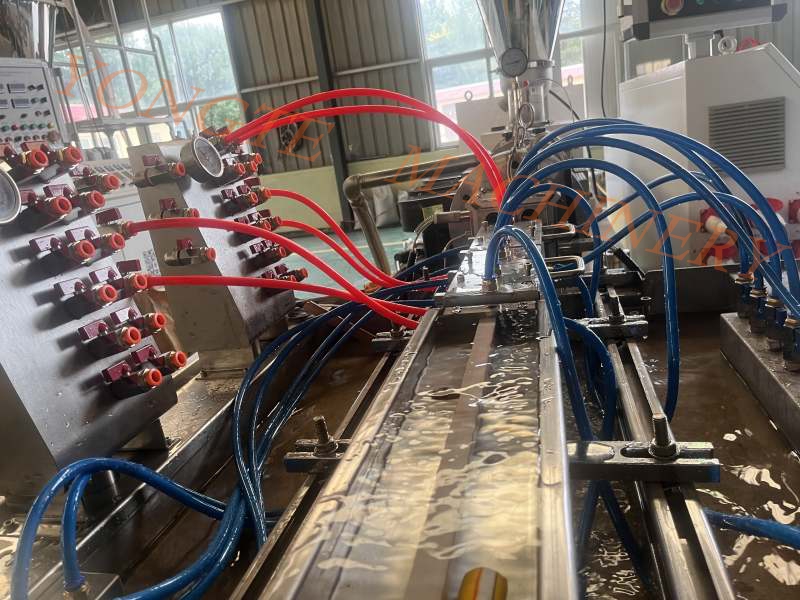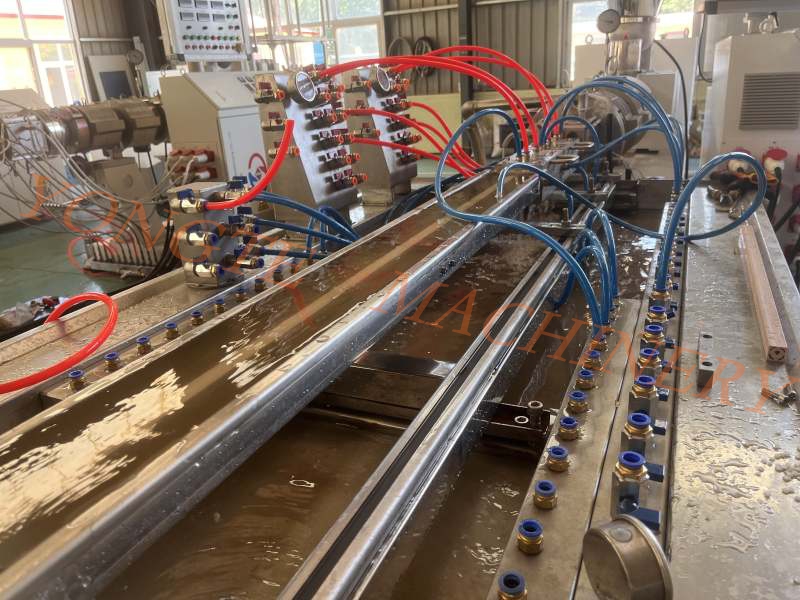How to solve the production problem of PVC cable trough? Yongte Plastic Machinery provides innovative solutions
According to data from market research organization Grand View Research, the global PVC cable trough market is expected to expand at a compound annual growth rate of 6.8% from 2023 to 2030. Due to the advancement of the "new infrastructure" strategy, the domestic market demand will increase by more than 12% year-on-year in 2024. However, behind the rapid growth of the market, the industry is facing severe technical challenges and urgently needs innovative breakthroughs.
In the processing temperature range of 160-200℃, the decomposition rate of PVC materials increases by 15% with every 5℃ increase in temperature, which directly leads to a decrease in the mechanical properties of the product by more than 20%. At the same time, its complex formula system has extremely high requirements for the production process. Once the ratio error of additives such as plasticizers and flame retardants exceeds 0.3%, the scrap rate will surge by 10-15%. In the molding process, if the extrusion parameter fluctuation exceeds ±2%, melt fracture will occur; the mold is corroded by HCl, and the average service life is shortened to 6,000 hours; in the cooling and shaping stage, if the temperature difference exceeds 3°C, the warping rate of large-size profiles is as high as 25%. In addition, the industry's strict requirements for product flame retardancy (must meet UL94 V-0 standard) and dimensional tolerance (±0.3mm), as well as the environmental protection policy's ban on traditional stabilizers, have further aggravated the production pressure of enterprises.

In response to the above industry pain points, Yongte Plastic Machinery relies on the accumulation of PVC cable trough extrusion equipment research and development to achieve full-process process optimization through core technology breakthroughs. In terms of the extrusion system, a twin-screw extruder with a length-to-diameter ratio of 25:1 is used, with a compression ratio design of 2.5-3:1, and equipped with a PID intelligent temperature control system to control the temperature control accuracy at ±1°C, ensuring uniform plasticization of the PVC multi-component system and avoiding the risk of thermal decomposition; the thickness of the chrome plating layer on the screw surface is ≥20μm, and the barrel is lined with tungsten carbide alloy to improve the corrosion and wear resistance of the equipment. The mold system uses mold flow analysis software to optimize the flow channel to achieve profile wall thickness deviation within ±0.1mm; the mold body is made of 4Cr13 stainless steel and supplemented with PVD coating treatment, and is equipped with a high-precision pressure sensor to control the pressure fluctuation to ≤5%, effectively extending the service life of the mold. The cooling and shaping stage adopts a three-level gradient cooling structure, the vacuum shaping mold negative pressure is maintained at -0.06 to -0.08MPa, the cooling water tank partition water cooling temperature difference is controlled at ≤3°C, and precise temperature control is used to avoid profile warping. In addition, the equipment also integrates a number of intelligent technologies. The traction mechanism uses servo drive to make the tension fluctuation ≤1%, the positioning accuracy of the CNC cutting device reaches ±1mm, the mixing and drying system controls the moisture content of the raw materials ≤0.03%, and the environmental protection treatment unit achieves HCl removal rate ≥95%. Through the PLC integrated control system and data monitoring platform, the real-time adjustment and dynamic monitoring of the parameters of the entire production process are realized.

In a 3-month large-scale production verification of a large cable trough manufacturing enterprise, Yongte Plastic Machinery's PVC cable trough production line showed significant advantages. Through real-time monitoring and dynamic adjustment of 12 core process parameters such as extrusion temperature and traction speed, the comprehensive product qualification rate jumped from the industry's general 88% to 96%, effectively reducing the scrap rate caused by defects such as dimensional deviation and surface bubbles. Relying on modular energy-saving heating systems and waste recycling devices, the energy consumption per unit product decreased by 22% year-on-year, and the raw material loss rate was reduced to 4%, achieving a significant optimization of 15% in unit production costs. This innovative solution, which integrates precision mold temperature control technology and online defect detection system, not only breaks through the technical bottlenecks of traditional processes in complex cross-section molding and high-speed production stability, but also realizes transparency of the entire production process through a digital workshop management system. At the moment of practicing the "dual carbon" goal, this technical solution helps enterprises complete the transformation and upgrading from traditional manufacturing to green smart factories, and builds a new paradigm for quality improvement, cost reduction and efficiency increase, and low-carbon development for the PVC cable trough industry, which is expected to become a key engine to promote technological innovation in the industry.